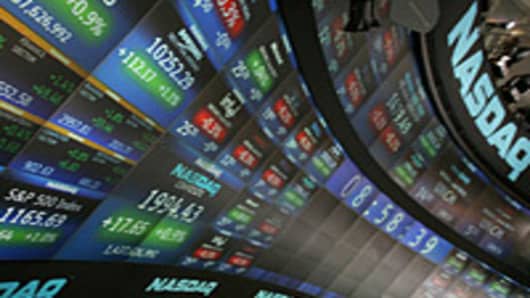A flood of cancelled orders was likely a factor in the Nasdaq trading snafu around the Facebook opening last Friday. Nasdaq was accepting orders to buy and sell — including cancellations — up until the moment of trading. But the system needed a few milliseconds to "freeze" the book, cross the buy and sell orders, and open the stock. The flood of orders — largely cancellations — never gave the book those few milliseconds it needed, and so the book apparently got caught in an infinite "loop" that prevented it from crossing the orders.
Much of this traffic was likely high-frequency traders, who cancel most orders they place. They do this because the machines determine that they cannot make money at that moment, or they are merely trying to "sniff out" buying or selling interest.
Tabb Group estimates that 95 percent to 98 percent of orders submitted are cancelled.
This is not going to stop high-frequency trading. It isn't meant to. The fee is relatively small: For Direct Edge, the fee only kicks in when the quote to trade ratio is over 100 quotes for every trade made. The fee is a loss of 1 penny per 100 shares on the rebate.
Most high-frequency shops will likely fall below that threshold and not have to pay, but it is a shot across the bow.
One problem: The exchanges all derive revenue from high-frequency guys. They are the ones helping pay the bills for the exchange. The exchanges have to walk a fine line. They don't want anyone to kill a major revenue source.
Elsewhere:
1) Economists cut forecasts amid global growth concerns. India and Australia are the latest countries to fall victim to downgraded gross domestic product outlook. Goldman Sachs and Bank of America slashed India’s growth forecast a day after the country’s currency, the rupee, hit a historic low against the U.S. dollar. Goldman cut India’s GDP estimate to 6.6 percent from 7.2 percent; Bank of America revised its outlook to 6.5 percent from 6.8 percent.
Australia received lowered GDP revisions from JPMorgan Chase. The bank trimmed Australia’s 2012 GDP estimate to 2.7 percent from 3.0 percent; it also cut its forecast for 2013 growth to 3.0 percent from 3.3 percent. JPMorgan upheld its upbeat expectation that Australia’s mining boom will continue to buoy the country’s economy.
2) A bad month, but a better week, for the major indices so far:
Market This Week This Month
S&P 500 +2.0% -5.5%
Germany +0.8% -6.6%
Spain -1.1% -7.3%
China -0.5% -2.6%
Japan -0.4% -9.9%
Brazil -0.8% -12.6%
—By CNBC’s Bob Pisani
_____________________________
Bookmark CNBC Data Pages:
_____________________________
Want updates whenever a Trader Talk blog is filed? Follow me on Twitter: twitter.com/BobPisani.
Questions? Comments? tradertalk@cnbc.com



